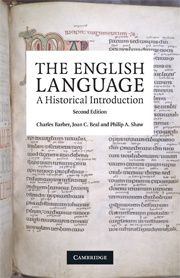Book contents
- Frontmatter
- Contents
- List of figures
- Preface to the second edition
- Preface to the first edition
- Map showing the counties of England
- 1 What is language?
- 2 The flux of language
- 3 The Indo-European languages
- 4 The Germanic languages
- 5 Old English
- 6 Norsemen and Normans
- 7 Middle English
- 8 Early Modern English
- 9 Late Modern English
- 10 English as a world language
- 11 English today and tomorrow
- Notes and suggestions for further reading
- Bibliography
- Index
9 - Late Modern English
- Frontmatter
- Contents
- List of figures
- Preface to the second edition
- Preface to the first edition
- Map showing the counties of England
- 1 What is language?
- 2 The flux of language
- 3 The Indo-European languages
- 4 The Germanic languages
- 5 Old English
- 6 Norsemen and Normans
- 7 Middle English
- 8 Early Modern English
- 9 Late Modern English
- 10 English as a world language
- 11 English today and tomorrow
- Notes and suggestions for further reading
- Bibliography
- Index
Summary
By about 1700, the main changes in pronunciation that made up the Great Vowel Shift were all completed, at least in the south of England. Third-person forms like loveth had disappeared from ordinary educated speech. The pronouns thou and thee and the corresponding verb-forms like lovest had disappeared from standard usage, except in special registers, such as religious usage. Auxiliary do had come to be used as we use it today. And, all in all, the language differed only slightly from present-day English. This can be seen if we look at a piece of writing from the early eighteenth century. The following is an extract from one of the numbers of The Spectator for the year 1711. It was written by Joseph Addison, who was fond of ridiculing the Italian opera, which was then in vogue in London:
The next Step to our Refinement, was the introducing of Italian Actors into our Opera; who sung their Parts in their own Language, at the same Time that our Countrymen perform'd theirs in our native Tongue. The King or Hero of the Play generally spoke in Italian, and his Slaves answer'd him in English: the Lover frequently made his Court, and gain'd the Heart of his Princess in a Language which she did not understand. One would have thought it very difficult to have carry'd on Dialogues after this Manner, without an Interpreter between the Persons that convers'd together; but this was the State of the English Stage for about three Years.
At length the Audience grew tir'd of understanding Half the Opera, and therefore to ease themselves intirely of the Fatigue of Thinking, have so order'd it at Present that the whole Opera is perform'd in an unknown Tongue.[…]
- Type
- Chapter
- Information
- The English LanguageA Historical Introduction, pp. 211 - 238Publisher: Cambridge University PressPrint publication year: 2009

